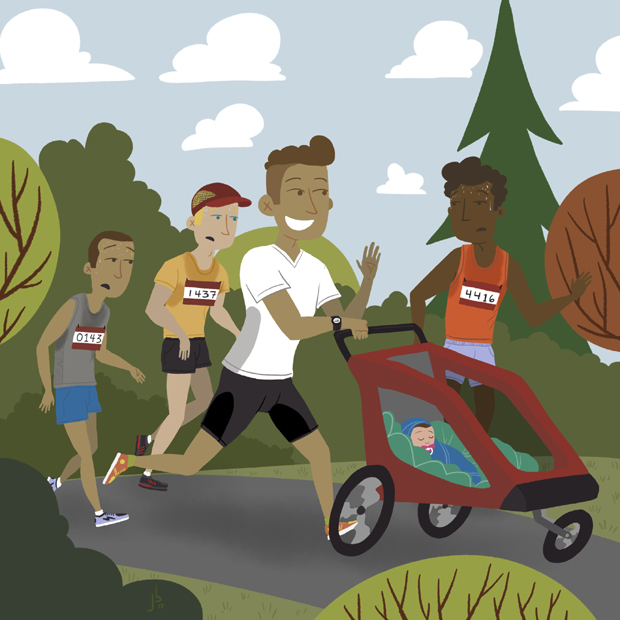Daddy doping

The secret of the new father’s racing success

It’s a bit of a poorly kept secret in the running community that women who manage to get back to training fairly soon postpartum can enjoy a boost in performance. But what about new dads? Is it possible that men can also see a spike in performance following the birth of a child?
The reasons for improvements in women’s performances are seen as mostly physiological: an increased blood oxygen level and a hormonal boost. But that can’t be so for men, can it? Could new dads that see their PB’s plummet be benefiting from something chemical, or is the phenomenon simply due to more rest, greater existential focus and happiness?
Let’s face it, most runners don’t like to rest. We’re not good at it. That’s why we run: we like to go, go, go. When you have a newborn, however, sometimes you just don’t get to run. And that’s OK. I know I didn’t really want to, at least not more than I wanted to spend time with my wife and son.
Quebec’s Philipe Viau-Dupuis had two weeks of very minimal training in late September 2014, just after his daughter was born. It did not seem to limit him, as he ran 2:20:42 in his second ever marathon at Philadelphia, two months after the birth. Rest can come in other ways. Anthony Franchini, a competitive age-group runner who ran a PB a month after his son was born, notes that, “because I stayed home on paternity leave, I gained two hours a day of restful time not spent commuting from the suburbs to downtown for work.” It wasn’t that he trained any more or less, but that he was more relaxed.
The issue of focus is predicated on the idea that you have less free time with a baby so you have to make the most of it. Viau-Dupuis, though already a disciplined runner, got up a little earlier for work and was able to maintain his training (once he got back to it) that way, without taking away from family time.
The benefits can extend beyond just the period immediately postpartum. Glenn Cowan noticed that his nutrition got better, “in an effort to avoid dietary hypocrisy” with his young kids. Since his daughter has started school, “we make her lunch, so we have been more regular about making our own lunches,” he said.
The biggest contributor, though, in talking to these dads, was their state of mind: they were happy.
Jason Warick’s Saskatchewan record of 2:19:39 was set in Chicago of 2006. Warick also managed a national silver medal at the Canadian championships in Ottawa in 2009. What both of those races had in common was that in the months prior, Warick’s children were born. The way Warick describes his Chicago experience, you would not think it was going to go well.
“I wasn’t sleeping, eating or resting normally. I didn’t have time for massage, strength work, cold/hot tubs or other ‘extras.’ I was also dealing with the guilt of leaving my stressed wife and often crying child to run, so it wasn’t as enjoyable.
It was also drizzling, windy and 0 C. Logically, it should not have gone well.” And yet, Warick describes what could be called the perfect marathon. “There was this calmness and grace I’d never felt before,” he reflected on what should have been a challenging race. “It felt as close to effortless as you can in a marathon, and I knew from the 30K mark that I was going break 2:20. I went to Chicago with my wife, Annie, my wife’s parents and brother. I felt incredible gratitude for all they sacrificed for me to do this.”
Phil Viau-Dupuis described a similar situation. “I usually put a lot of pressure on myself for no particular reason,” he admitted of his races prior to becoming a father. “Since I’m not the most important person in my life now, all my running has been put into perspective.”
John Lofranco is a coach with McGill Olympic Club, the head of Athletics Canada’s road racing
division, a contributing editor at Canadian Running and a new father.


